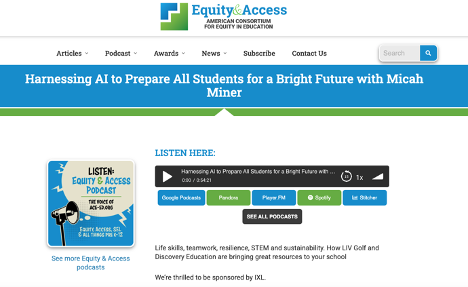Empower Kids Online: A Must-Have Resource for Digital Citizenship!

Turn Your Students into Savvy Digital Citizens

In the midst of researching this week’s blog post entitled, “Level Up Learning: How Gamification Transforms the Classroom,” we came across a gem we just have to tell you about (if you don’t know about it already): Common Sense Media Education.
"Common Sense Education is a great site. It provides free access, and many districts use it for their digital citizenship curriculum.”
~ Micah Miner, expert in EdTech and social studies curriculum, educational thought leader, curriculum consultant and author of AI Goes to School
The Digital Lowdown
Common Sense Education is widely considered a valuable resource for educators, offering in-depth reviews of educational technology tools, comprehensive digital citizenship curriculum, and curated lists of age-appropriate media, making it a trusted platform for teachers to navigate the digital landscape and select appropriate materials for their students.
However, however, some critiques mention occasional navigation issues and a potential lack of detailed implementation strategies for certain reviewed tools.
Some of the Features You'll Find
- Free activities and lessons on digital citizenship for grades K-12
- In-depth expert reviews of EdTech tools
- Comparisons of the best edtech tools by category
- Professional Development resource
- Reviews of books, movie, TV reviews, games, podcasts and apps
Key Strengths
- Comprehensive reviews: The site provides thorough reviews of educational apps, websites, and platforms, considering factors like pedagogical value, age-appropriateness, accessibility, and potential risks.
- Digital citizenship focus: It also offers extensive resources on digital citizenship education, helping teachers equip students with skills to navigate online safely and responsibly.
- Curated content: Common Sense curates lists of high-quality educational tools based on age and subject area, making it easier for teachers to find relevant resources.
- User-friendly interface: The website is designed to be easy to navigate and search, allowing you to quickly access the information you need.
- Credibility and expertise: Common Sense Media has a strong reputation for providing independent, research-backed reviews, so you can feel confident about the info you find there.
Potential Limitations
- Limited implementation guidance: While reviews provide detailed information on tools, some users may desire more specific guidance on how to integrate them effectively into their curriculum.
- Potential bias: Some critics argue that Common Sense Media's reviews may reflect a certain conservative viewpoint on media content.
- Navigation complexities: Although generally user-friendly, some users may find the site's structure slightly confusing, especially when navigating through multiple categories.

Sample Lesson:
Taking a Stand of Cellphone Bans
What are the impacts of a school-wide cellphone ban?
Features:
- A specific lesson for grades 6-12, 20 minutes, called “Taking a Stand on Cell Phone Bans”
- Expand the conversation with an article entitled, “Should Your School Have a Cellphone Ban? Use these tips to determine what will work best for your school community."
- A collection of 15 free lessons entitled “Digital Well-Being Lessons for Grades K–12: Research-based lessons to support students' social-emotional learning and digital well-being.”
The Final Word
We all know that digital learning in the classrooms is here to stay. Common Sense Education is a valuable resource when you’re looking to make informed decisions about technology integration in your lessons, especially when it comes to digital citizenship and selecting age-appropriate media.
As always, though, be aware of potential limitations and consider supplementing reviews with additional research based on your specific needs.
What do we need to learn about AI and digital literacy?
Harness AI and Hone Your Skills
Read More
- “Level up Learning: How Gamification Transforms the Classroom.” X10 Publications blog post. February 17, 2025.
- “How Educators Can Use Artificial Intelligence to Level Up.” X10 Publications blog post. February 12, 2025.
- Miner, Micah. 2024. AI Goes to School: How to Harness Artificial Intelligence in Education to Prepare Students for the Future (and Make You an Even Better Teacher. Times 10 Publications.
- Miner, Micah. “Flexing Your C.O.R.E.: Cultivating Critical Thinking and Civic-Mindedness in Digital Citizenship and Social Studies Education.” Micahminer.com blog post. August 19, 2024.
- Rogers-Whitehead, Carrie. “3 Ways School Leaders Can Support Digital Citizenship.” ISTE blog post. February 28, 2023.

What's Technoskepticism?
Is it bad, or is it good?
Find out here.
Catch the latest in technoskepticism and emerging technologies as Micah Miner, EdTech expert and author of AI Goes to School, talks with Ross Romano on the podcast “Harnessing AI to Prepare All Students for a Bright Future” on ACE-ED Educational Talk Radio.
Do you know what's stressing out teens today?
In collaboration with the Harvard Graduate School of Education (Center for Digital Thriving) and Indiana University, Common Sense Media released a report on their survey of over 1,500 teens nationwide, ages 13-17 concerning the pressures they face and how they mitigate the stress.
Read the report to find out what they learned ... you may be surprised.
Resources
-
Lenhart, Amanda. “Is Today’s Grind Culture Leading to Teen Burnout?” Common Sense Media. October 10, 2024.
-
Girls on cell phone image by Gary Cassel from Pixabay.
-
Report cover image from commonsensemedia.org.
-
Students and iPad image by April Bryant from Pixabay.
Share the Love
Got friends who can benefit from these Hacks?
Forward this to them and remind them to sign up here.
Level up with more from Educator's Edge
Love Educator’s Edge?
Check out Sunday Morning Life Hacks to balance both Life (with a capital L) and Work (ditto, W).













Responses